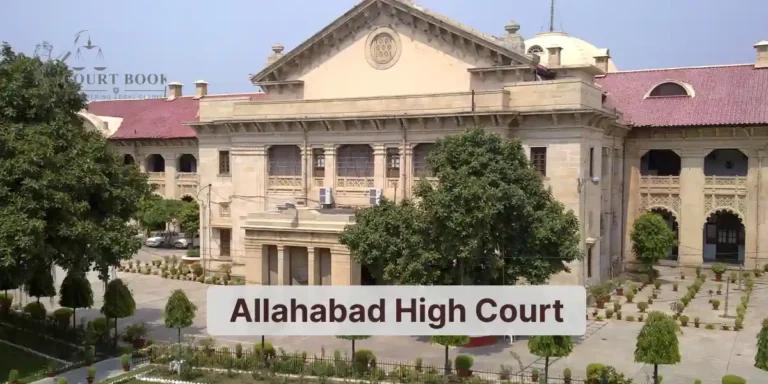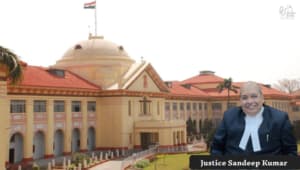The Allahabad High Court has recently made a key observation regarding ongoing criminal trials, stating that once an investigation is completed, a chargesheet has been filed, and the trial has begun, higher constitutional courts should typically avoid reopening or transferring the investigation to another agency.
"Where the investigation has already been completed and charge sheet has been filed, ordinarily superior courts should not reopen the investigation and it should be left open to the court, where the charge sheet has been filed, to proceed with the matter in accordance with law," the bench observed.
The division bench of Justice Mahesh Chandra Tripathi and Justice Prashant Kumar made this ruling while dismissing a criminal writ petition filed by Usman Ali, who had requested the transfer of investigation in his brother’s murder case from the Crime Branch-Criminal Investigation Department (CBCID) to the National Investigation Agency (NIA) or the Central Bureau of Investigation (CBI).
Case Background
- On October 25, 2018, Usman Ali registered an FIR following the murder of his brother, Imtiyaz Ahmad, who was the sitting chairman of Topan Town area in Sonbhadra.
- Initially, the Sonbhadra police handled the investigation. Later, it was transferred to CB-CID reportedly at the request of the accused.
By February 2020, the Investigating Officer submitted a chargesheet before the Chief Judicial Magistrate (CJM), charging eight persons and exonerating the accused Rakesh Jaiswal and Ravi Jalan, despite them being named in the dying declaration. The magistrate took cognizance of the chargesheet the following day.
The petitioner alleged that:
- The transfer to CBCID was orchestrated by Jaiswal and Jalan.
- CBCID, under their influence, exonerated them deliberately.
- UAPA provisions should have been invoked based on the Supreme Court’s judgment in Arup Bhuyan vs State of Assam 2023 LiveLaw (SC) 234.
After filing a protest petition, which was rejected in August 2020, Usman Ali moved the Sessions Court. The Sessions Court pointed out investigative lapses and sent the matter back to the Magistrate.
In May 2022, the Magistrate:
- Allowed the protest petition,
- Directed further investigation, and
- Asked the DGP to take action against the IO for lapses.
Read also:
The case was subsequently shifted from CB-CID Varanasi to CB-CID Prayagraj, and a fresh charge sheet was filed, reportedly including Jaiswal and Jalan. However, this new chargesheet was not made part of the record by the CJM, Sonbhadra, even though an application for the same was filed. This rejection happened in September 2024.
Usman then approached the High Court under Section 482 CrPC, and that matter is still pending.
Meanwhile, the trial had already started in the Sessions Court, Sonbhadra, and eight prosecution witnesses had been examined.
The High Court considered a crucial legal question:
Can the investigation be transferred to CBI/NIA after the trial has commenced and witnesses have been examined?
The petitioner’s counsel — Senior Advocate Rakesh Pande, assisted by Advocates Mohd. Aman Khan and Krishna Kumar Verma — argued that constitutional courts can order fresh or de-novo investigation even after the trial has started and some witnesses have been examined.
However, the High Court differed, noting:
“While a direction to conduct further investigation after the chargesheet and during the trial is allowed in law, reopening the entire investigation is a different matter and should not be done routinely by superior courts.”
The Court further stated that if the trial is underway, the trial court itself has powers under Section 311 CrPC (now Section 348 BNSS) to:
- Recall witnesses,
- Summon new ones, even if both sides have closed their evidence.
The Court also touched upon the request to transfer the investigation to the CBI or NIA, referring to the Supreme Court ruling in K.V. Rajendran vs Superintendent Of Police, CBCID South (2013).
The Supreme Court had emphasized that such transfers are:
“Rare and exceptional, only when justice demands it or the State police lacks credibility, and when it is necessary to ensure a fair and impartial investigation.”
The High Court reiterated this view, stating:
“We also find that Hon'ble Apex Court, while dealing with the issue under what circumstances the investigation can be transferred from the State investigating agency to any other independent investigating agency like CBI, has consistently held that the power of transferring such investigation must be in rare and exceptional cases where the court finds it necessary in order to do justice between the parties and to instil confidence in the public mind, or where investigation by the State police lacks credibility and it is necessary for having ‘a fair, honest and complete investigation’, and particularly, when it is imperative to retain public confidence in the impartial working of the State agencies.”
In view of these observations, the Court refused to allow the plea and thus, the same was dismissed.
Case title - Usman Ali vs. State of U.P. and 12 others 2025 LiveLaw (AB) 124














